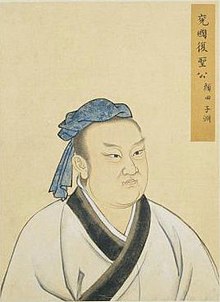Yan Hui (disciple of Confucius)
| Yan Hui | |||||||||
 |
|||||||||
| Traditional Chinese | 顏回 | ||||||||
|---|---|---|---|---|---|---|---|---|---|
| Simplified Chinese | 颜回 | ||||||||
|
|||||||||
| Transcriptions | |
|---|---|
| Standard Mandarin | |
| Hanyu Pinyin | Yán Huí |
| Wade–Giles | Yen Hui |
Yan Hui (Chinese: 顏回; Wade–Giles: Yen Hui; 521?–481 BC) was the favorite disciple of Confucius and one of the most revered figures of Confucianism. He is venerated in Confucian temples as one of the Four Sages.
Yan Hui is also known by his courtesy name Ziyuan (Chinese: 子淵; pinyin: Zǐyuān; Wade–Giles: Tzu-yüan), and as Yan Yuan (Chinese: 顏淵; Wade–Giles: Yen Yüan), a combination of his surname and courtesy name. He is also reverently referred to as Master Yan or Yanzi (Chinese: 顏子; Wade–Giles: Yen Tzu).
Yan Hui was a native of State of Lu, and was the son of Yan Wuyou (Yan Lu), one of the earliest disciples of Confucius. Yan Hui was about 30 years younger than Confucius, and became a student of the Master at a young age.
Yan Hui was Confucius' favorite disciple. "After I got Yan Hui," Confucius remarked, "the disciples came closer to me." We are told that once, when he found himself on the Nang hill with Yan Hui, Zilu, and Zigong, Confucius asked them to tell him their different aims, and he would choose between them. Zilu began, and when he had done, the master said, "It marks your bravery." Zigong followed, on whose words the judgment was, "They show your discriminating eloquence." At last came Yan Hui, who said, "I should like to find an intelligent king and sage ruler whom I might assist. I would diffuse among the people instructions on the five great points, and lead them on by the rules of propriety and music, so that they should not care to fortify their cities by walls and moats, but would fuse their swords and spears into implements of agriculture. They should send forth their flocks without fear into the plains and forests. There should be no sunderings of families, no widows or widowers. For a thousand years there would be no calamity of war. Yu would have no opportunity to display his bravery, or Ts'ze to display his oratory." The master pronounced, "How admirable is this virtue!"
...
Wikipedia
